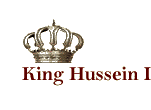 |
 |
Democracy and Human Rights Dangers to Democracy Some parties of the national movements succeeded in their early days in mobilizing public opinion around the issue of independence. But later, the political elites were not able to lead Arab societies in the quest for development and progress. They failed to maintain the bridges that linked them with their popular base, as a result of their obsession with security, and their view that they had a right of tutelage over others, the right to confiscate their freedom, and the right to think for them. They forgot that any objectives proposed by any authority in today’s world cannot be valued higher than human rights. Instead, such objectives should be derived from human rights, and they should be devoted to serve and further these rights. Address to the Meeting of Arab Political
Parties
A vast chasm separates objective, constructive criticism, which emanates from concern for the higher national good, from attempts at slander and defamation. Pluralism does not permit any side to claim a monopoly on truth. No side may claim for itself the sole prerogative to confer the quality of good citizenship. None may claim to be more concerned for the national good than another. Address to Mo’tah University
We must shun any continuance of vilification of others, because that would diminish the democratic process, give free rein to ignorance and take us back to a new Jahiliyya though in modern clothing. Perhaps what we should resist most of all is the tendency to make quick, emotional and superficial judgments on others—from a position different from theirs and without any responsible or realistic examination of their actions or decisions taken in the course of fulfilling their duties. Address to the Nation
My concern all along, I have warned time and again, is of Jordan becoming a battleground for forces outside its immediate area. This is where we went haywire in the 1950s and I hope this will never be repeated. Interview with The Financial Times
Democracy must not be mistaken for irresponsible freedom. It is not a license for libel and defamation. It is not a license to cross the demarcation lines separating authorities. It is not a silk cloak under which to conceal poisoned daggers. It is not an invitation for each of the authorities to set traps for the other at the expense of the public good, instead of cooperating to promote it. It is not an umbrella for terrorizing the minds of others. It is not the means for the despotism of a majority against a minority. That would lead to anarchy which would kill democracy and bring about the ruin of the land and people. A democratic society is one that respects the law, because it is the lawmaker. A democratic society is one of free but responsible dialogue. A democratic society is one that allows for a multiplicity of opinions, on conditions of everyone respecting the opinions of others and being committed to the public good. A democratic society is free from intimidation which expunges creativity and excellence from society. A democratic society is free from despotism which paralyzes it. A democratic society is one of competition free from violence, fanaticism, vindictiveness, hatreds and vendettas. Address to the Jordanian National Congress
History teaches us that democracy, when rife with vindictiveness, rage, and anarchy, almost destroyed even its first birthplace, which was the state of Athens at the peak of its greatness under Pericles. Democracy was then practiced with vindictiveness and as a guest to settle feuds rather than in pursuit of the public good. I mention this only to stress that the threat to democracy can come primarily from people who shield themselves behind it, and who abuse democracy in the very name of democracy, whether they do so deliberately or inadvertently. Democracy does not consist merely of institutions. It is a tradition and a way of life that distinguishes society. I make this clear reference to emphasize that the nation comes first and foremost. Every political party that comes to life in democracy and under its protection, must necessarily be a national party in its basic tenets, objectives, methods, funding and affiliation. Any departure from this fact would not only be a violation of democracy, but an act against the nation. This, of course would not prevent a party from having a pan-Arab or pan-human dimension, but true nationalism must always be the real criterion for political action on the national, pan-Arab, or human levels. We must remember that it is only natural for a nation to have its own priorities according to its resources, size, demography, and responsibilities. Just as others do not allow us to define their priorities for them, we allow none to define ours. The possibility of a confluence of priorities and objectives between Arab states, or some of them opens the door for the confluence of thought between various parties, without sacrificing one's national interest. What is not permissible is the development of a state of party subservience to outsiders. Should this happen, the party would then lose its national character and violate the principles of the National Charter. Address to the Jordanian National Congress |